| Srl | Item |
| 1 |
ID:
099148
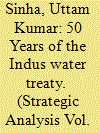

|
|
|
| 2 |
ID:
099151


|
|
|
| 3 |
ID:
099158
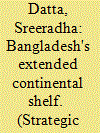

|
|
|
|
|
| Publication |
2010.
|
| Summary/Abstract |
The Bay of Bengal is the largest bay off the coast of Bangladesh, India, Myanmar and Sri Lanka. With the exception of Bangladesh all the littoral states have reached agreements over their bilateral maritime boundaries. As signatories to the UN Convention on the Law of the Sea, India and Myanmar had to file their claims by June 29, 2009 and by May 21, 2009 respectively, and Bangladesh has to file its claim by July 27, 2011 to the Commission on the limits of the continental shelf. In recent years there has been a sudden spurt of marine economic activities by all the states in their adjacent waters, as each wished to maximise its options and stake their claims on the rich natural resources. This article identifies the differences that Bangladesh has with India and Myanmar over shared maritime boundaries, and the factors that are hindering the resolution of the issue.
|
|
|
|
|
|
|
|
|
|
|
|
|
|
|
|
| 4 |
ID:
099160
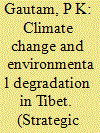

|
|
|
|
|
| Publication |
2010.
|
| Summary/Abstract |
Both the Chinese government and the Tibetans are in agreement over the impending issues relating to the adverse impact of climate change on Tibet while the India-specific data on glacier melt is as yet inconclusive. There is, however, a difference of perception in Sino-Tibetan discourse over the capitalist model of economic development being undertaken by China which is at variance with the cultural practices of Tibetans, informed and regulated as they are with the Buddhist values of oneness with nature. Nomadism is also fundamental to the preservation of the ecology of Tibet. The Chinese policy of encouraging non-Tibetan influx of population, greater than the sustainable carrying capacity of Tibet, is enhancing the danger of an ecological meltdown. Due to ecological interconnectedness and interdependence, the article argues that Tibet, the water tower of Asia, should be preserved as a regional if not a global common for the sake of south Asian security.
|
|
|
|
|
|
|
|
|
|
|
|
|
|
|
|
| 5 |
ID:
099155
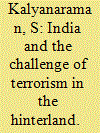

|
|
|
|
|
| Publication |
2010.
|
| Summary/Abstract |
Terrorism in the Indian hinterland is the result of a complex set of inter-related factors. The development of a jihad culture in Pakistan during the course of the Afghan conflict in the 1980s led to the subsequent Pakistani decision to employ jihad against India as a strategy. The mobilisation of the Hindu Right in India and ensuing communal violence led to the radicalisation of Muslim youth and the resort to terrorism by both Indian Islamists and Muslim criminal networks with help from Pakistan. Terrorist attacks by Pakistani jihadists and Indian Islamists, in turn, radicalised elements within the Hindu Right and set the stage for their turn towards terrorism in the last few years.
|
|
|
|
|
|
|
|
|
|
|
|
|
|
|
|
| 6 |
ID:
099153


|
|
|
| 7 |
ID:
099152
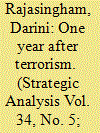

|
|
|
| 8 |
ID:
099164
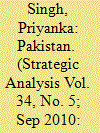

|
|
|
| 9 |
ID:
099149


|
|
|
| 10 |
ID:
099150
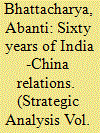

|
|
|
| 11 |
ID:
099162


|
|
|
|
|
| Publication |
2010.
|
| Summary/Abstract |
The changing nature of warfare, as the twentieth century drew to a close, saw the increased proliferation of conflict between non-state actors and the state. Small wars, wars of liberation, insurgencies, terrorism, proxy wars, sub-conventional warfare and a host of other terminologies emerged that attempted to fingerprint this genre of low spectrum warfare. Initially, it was felt that it was risky to use air power in this kind of warfare and that surface forces were best equipped to fight these wars with only superficial support from air forces. However, as the twenty-first century unfolded, the use of air power in Kargil, Iraq, Afghanistan, Lebanon and Sri Lanka in diverse roles has sparked off a fresh debate on the effective employment of air power at the lower end of the spectrum of warfare.
|
|
|
|
|
|
|
|
|
|
|
|
|
|
|
|
| 12 |
ID:
099157


|
|
|
|
|
| Publication |
2010.
|
| Summary/Abstract |
As high-profile incidents of piracy become more common off Somalia, strategists have taken to urging the US government to send expeditionary forces ashore. The article uses history and Clausewitzian theory to estimate the nature of the threat and the likely efficacy of a land campaign. Even successful operations would entail costs exceeding the value of the political stakes. For this reason alone, going ashore is inadvisable. The article also spotlights the geopolitical implications of counterpiracy, forecasting that an overbearing or botched campaign would damage the US efforts to marshal a maritime coalition in the Indian Ocean region. This further militates against hasty action.
|
|
|
|
|
|
|
|
|
|
|
|
|
|
|
|